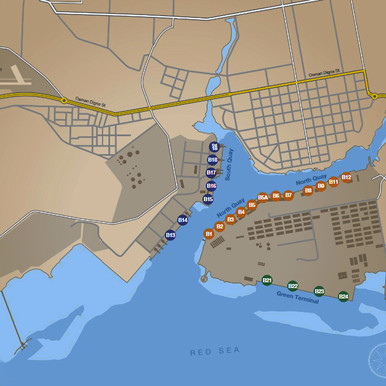[ad_1]
Sudan’s Alternative Sea Port Workers Union announced its rejection of a reported project to establish a new port funded by Abu Dhabi Ports in partnership with the DAL Group private company. The company itself has denied reaching any agreements.
Osman Taher, head of the Alternative Syndicate, told Radio Dabanga that the United Arab Emirates is a major competitor to Sudan’s ports in the Red Sea and cannot seek to develop them.
He warned the Dal Group not to go ahead with this step, threatening to close all its facilities in the port. He called for the implementation of the project for the benefit of Sudan in cooperation with regional and international banks in order to preserve Sudan’s sovereignty.
The Abu Dhabi Ports Company, listed on the Abu Dhabi Securities Exchange, in turn denied concluding agreements to enter into a joint venture to build a port in Sudan.
The company indicated that it is “in preliminary discussions with the concerned authorities in Sudan, in light of its continuous efforts to study and evaluate new projects”.
It confirmed that it will disclose to the market if any new project and investment is approved or approved in accordance with the applicable regulations.
Osama Daoud, owner of the Dal Group, a partner in the project, told Reuters on Sunday that the United Arab Emirates will build a new port on the Red Sea in Sudan, as part of an investment package worth $6 billion.
Osama Daoud said that the $4 billion port, which is a joint venture between the Dal Group and Abu Dhabi Ports, owned by Abu Dhabi Holding Company, will be able to handle all types of goods and compete with the country’s main national port, Port Sudan. He said it was located about 200 kilometres north of Port Sudan.
The grassroots resistance committees that signed the People’s Power Charter reject the privatisation of Sudan’s ports and the establishment of new parallel ports owned by foreign companies or countries, explaining that this means the gradual end of Sudan’s sovereignty.
The resistance committees said in a statement yesterday that this directly leads to the transformation of the ports of Port Sudan and Suakin into “abandoned ruins”.
The new project “deprives Sudan of controlling and managing the incoming and outgoing movement, and turning it into an open focus by multinational companies”.
The statement stressed “the non-recognition of any local or international agreement concluded by the current coup government”.
It said that “countries, institutions and companies have warned against entering as parties to such deals as they are destined to fall with the fall of the coup” and called on “all the resistance committees and other revolutionary groups to reject these corrupt deals”.
Port renewal plans
During a visit to Port Sudan last month Gen Mohamed ‘Hemeti’ Dagalo, Vice-President of Sudan’s Sovereignty Council said he has “reviewed all the shortcomings in the Red Sea ports”, and that a matrix has been developed to address the issues at the seaports.
Emirates partnerships
As previously reported by Radio Dabanga, Sudan’s Acting Foreign Minister, Ali El Sadig, says an agreement designed to enable banks to perform their role in the development of Sudan’s economy, has been negotiated between Sudan, the United Arab Emirates (UAE), and the private sectors.
El Sadig was speaking at Khartoum airport on Sunday the return from the UAE of a high-level delegation, headed by the Chairman of the Sovereignty Council, Gen Abdelfattah El Burhan.
He said that the Sudanese and Emirati delegations “agreed to establish large strategic economic partnerships in roads, ports, railway, military cooperation, and exchange of experiences”.
Workers at the sea ports in Red Sea state expressed their concerns about the privatisation of the Port Sudan port following the agreement between El Burhan and the Abu Dhabi’s heir apparent, on partnership in the field of sea ports.
Sea ports workers leader Osman Taher told Radio Dabanga that the UAE ports are a major competitor to the Red Sea ports and therefore cannot partner. He expressed the workers concerns over the port of Port Sudan. The agreement with Abu Dhabi may lead to the closure of the Port Sudan port in favour of the UAE ports.
He pointed to the high shipping cost from global ports to Port Sudan of $12,000 for a container compared to $8,000 to the Egyptian ports, and said that shipping companies as well expect the closure of the Port Sudan port.
[ad_2]
Source link








